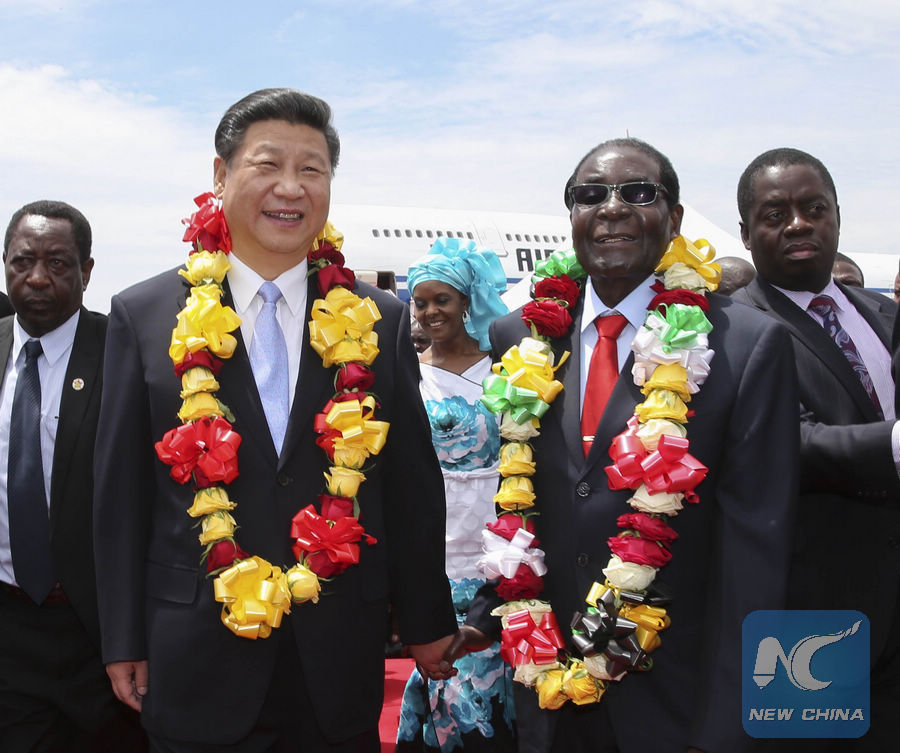
File photo shows Chinese President Xi Jinping (L, front) welcomed by Zimbabwean President Robert Mugabe in Harare, Zimbabwe, Dec. 1, 2015. (Xinhua/Lan Hongguang)
HARARE, April 18 (Xinhua) -- As Zimbabwe celebrates Independence Day on April 18, China remains the country's all-weather friend and continues to give a helping hand during difficult times.
The Chinese embassy in Harare is as old as Zimbabwe's independence, having opened on the same day the Union Jack was put down to symbolize the end of British rule and give way to black majority rule nearly 37 years ago.
Today, relations between the two countries continue to grow on the political, economic and cultural fronts.
China was one of the first countries to rally behind Zimbabwe when it issued a distress call in March for assistance following floods that left hundreds of families homeless and in need of food by donating 1 million U.S. dollars to the government on March 31.
Heavy rains that were worsened by Cyclone Dineo in mid-February left 271 people dead, another 128 injured and nearly 2,000 homeless.
The deaths were caused by lightning strikes, drowning and landslides, according to the Civil Protection Unit, which added that nearly 2,600 homesteads were damaged in varying degrees.
The Chinese Red Cross Society also gave 50,000 dollars and the Chinese embassy and community in Zimbabwe gave another 10,000 dollars to help the flood victims.
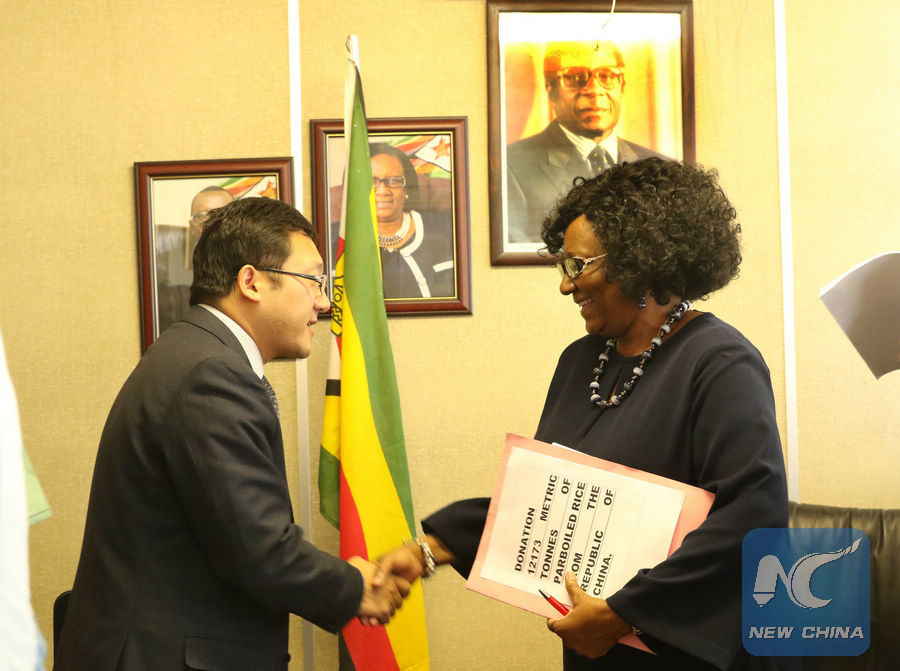
Public Service, Labor and Social Welfare Minister of Zimbabwe Prisca Mupfumira (R) shakes hands with Luo Xi, third Secretary of the Economic and Commercial Counsellors at the Embassy of China in Zimbabwe during a rice-donating signing ceremony in Harare, Zimbabwe, April 3, 2017. China donated 12,173 tonnes of rice to Zimbabwe to assist vulnerable people that were affected by drought which wreaked havoc last year. (Xinhua)
On April 3, China also donated 12,000 tons of rice to assist the needy, including the victims of the recent floods.
This was in addition to another 19,000 tons of rice Zimbabwe received from China in 2016 following President Mugabe's declaration of a state of disaster after an El Nino induced drought ravaged parts of the country in 2015/16.
Public Service, Labor and Social Welfare Minister Prisca Mupfumira, who received the latest donation, was full of praise for the Chinese government for the assistance.
"Today we are witnessing another contribution from China where they are donating 12,173 tonnes of rice to Zimbabwe. We appreciate the gesture made by China," the minister said.
Chinese Embassy official Luo Xi said the donation was testimony of China's commitment to maintaining strong, friendly ties with Zimbabwe.
With weather conditions hovering between droughts and floods in recent years, China also came to Zimbabwe's assistance in 2014 when it donated 500,000 dollars to help flood victims in Masvingo province.
Also in 2014, China and Zimbabwe signed agreements under which China would provide financial support for the development of economic enablers such as energy, roads, railways, telecommunication, agriculture and tourism.
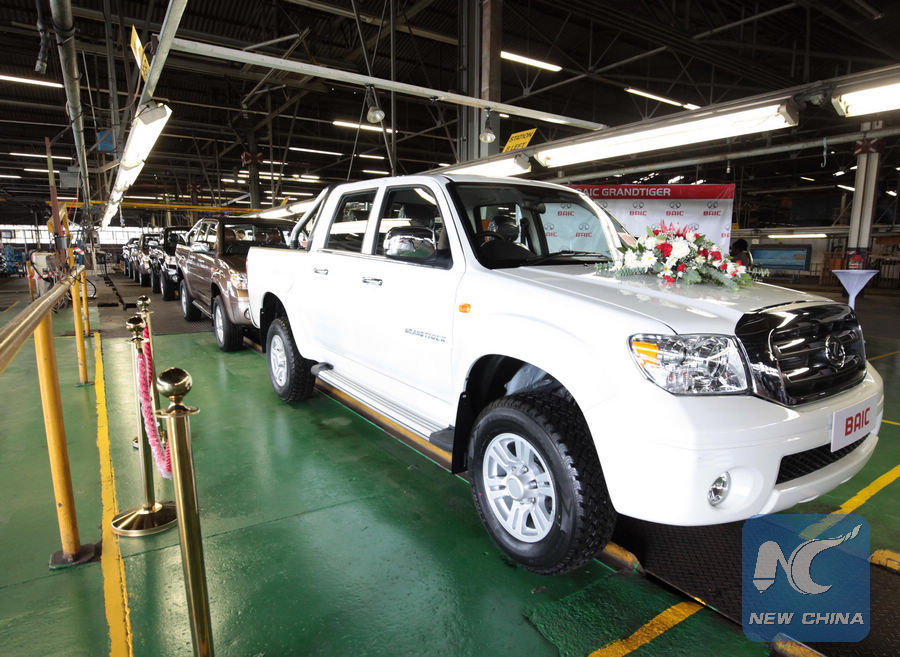
Photo taken on March 27, 2017 shows Grand Tiger pickup trucks on the production line in Harare, Zimbabwe. (Xinhua)
This was followed by more signing of agreements during President Xi Jinping's visit to Zimbabwe in December 2015 where, among others, one was signed for the assembly of Chinese motor vehicles in Zimbabwe.
The motor vehicle deal culminated in Chinese automotive company Beijing Automotive Group Co. Ltd (BAIC Group) forming a joint venture with two Zimbabwean companies to form Beiqi Zimbabwe (Pvt) Ltd which recently launched a top of the range pick-up truck - the Grand Tiger.
The local partners are the government-owned Willowvale Mazda Motor Industries (which had not been operational for more than four years) and automotive and spare parts dealer Astol Motors who jointly own 49 percent of shares in the joint venture.
China has over the past few years been the largest investor in Zimbabwe, injecting more than 46.5 million dollars in Foreign Direct Investment between January and November 2015.
Chinese ambassador to Zimbabwe Huang Ping recently outlined the projects which had recently been completed or were in progress in the country with China's assistance.
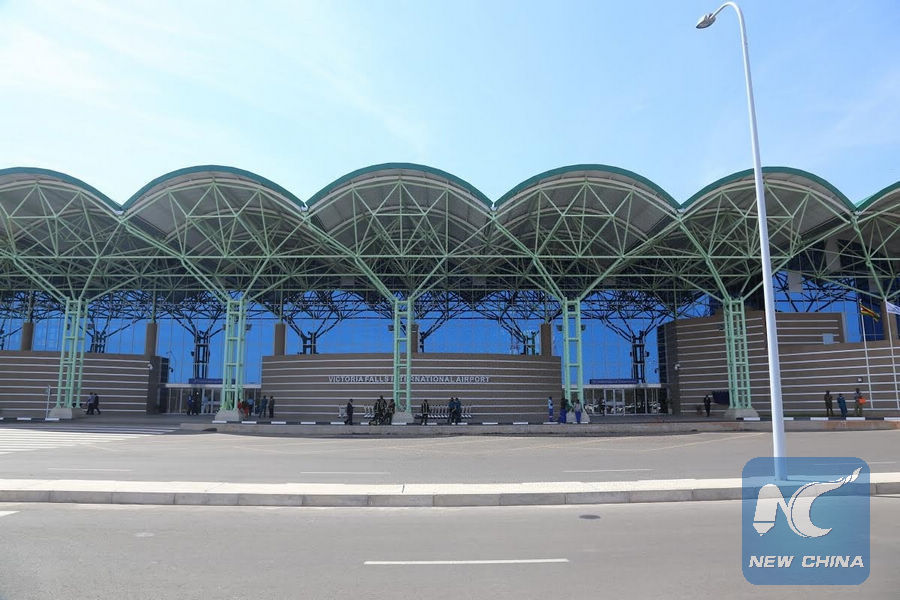
Photo taken on Nov. 18, 2016 shows the International terminal of Victoria Falls in Victoria Falls, Zimbabwe. Zimbabwean President Robert Mugabe on Friday commissioned the upgraded Victoria Falls International Airport that was built with support from China. (Xinhua/Chen Yaqin)
These include the new Victoria Falls International Airport which was done by China Jiangsu International and financed through a 150 million-dollar-loan from China Export Import Bank and was commissioned by Mugabe in the end of 2016.
The Kariba Hydropower Expansion Project is expected to be completed in early 2018 at a cost of 355 million dollars to add 300 MW to the existing 750 MW installed capacity.
"One generator is going to be put into operation by the end of this year," he said.
He also said the expansion of Hwange Thermal Power Station was expected to be financed by the Chinese Eximbank while telecommunications projects were also progressing well.
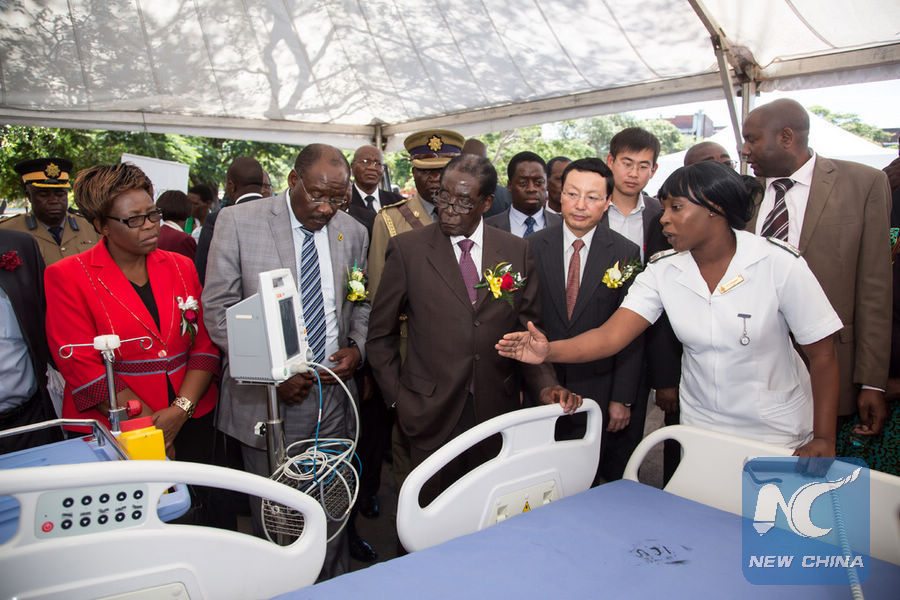
Zimbabwean President Robert Mugabe (front C) inspects hospital equipment purchased with 100-mln-USD Chinese loan. (Xinhua)
In sickness and in health, the Chinese have stuck with Zimbabwe as evidenced by the agreement by China to build a pharmaceutical warehouse in Harare.
"The Harare Pharmaceutical Warehouse Project has finished the inspection work and the minute has been signed by the two sides," Huang said.
China also built a 6 million dollar hospital in rural Marondera, Mashonaland East Province, under the Forum for China-Africa Cooperation (FOCAC).
The 129-bed Mahusekwa Hospital, also known as the China-Zimbabwe Friendship Hospital and located about 70 km to the south of Harare, opened its doors to the public in 2013.
It offers emergency treatment, x-ray, ultrasound scan, maternity and dental services as well as specialist services such as CT scan, endoscopy and orthopaedics.
With a staff complement of 175 staff members including three medical doctors, the hospital is supposed to serve Marondera District which has an estimated population of around 187,000.
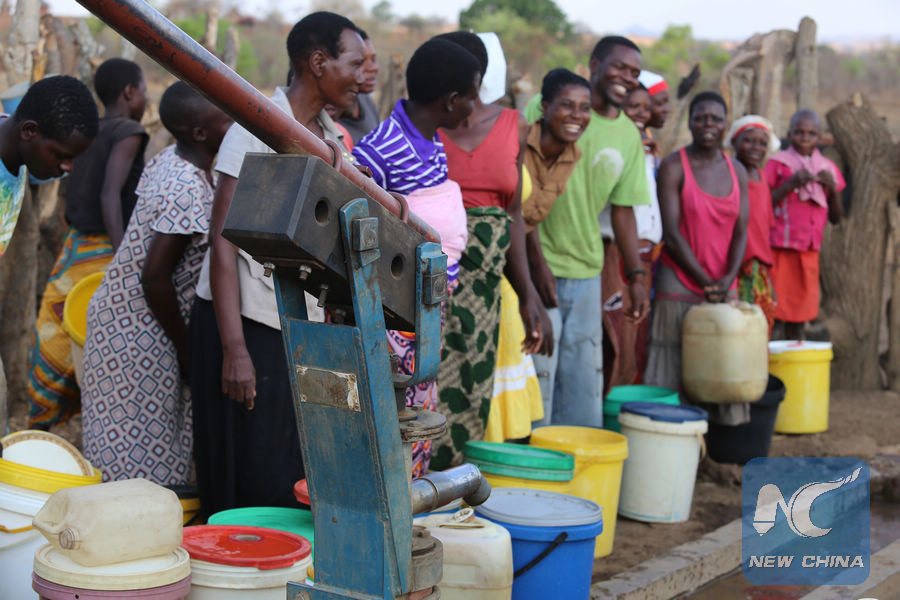
People queue at the borehole of Nyamasota Village in Rushinga, Zimbabwe, November 3, 2016. The borehole was drilled in 2013 and has never dried up like others in the area. The Chinese government is funding the borehole project which is being implemented in three phases and targeting to drill about 500 boreholes in Zimbabwe from 2012 to 2017. (Xinhua/Chen Yaqin)
However, due to the extensive and specialist health services it offers, the hospital attracts people from Harare and as far as 200 km away.
China has also in recent years offered health support to Zimbabwe, including a 90 million dollar medical loan facility for the supply of medical equipment and drugs.
Harare is also implementing a water and sanitation rehabilitation project to boost water supply to the city under a 144 million dollar loan facility financed by the China Eximbank.
China has also built schools under FOCAC, and together with the Chinese community in Zimbabwe, given to charity.
"China is a friend indeed and has helped us during our times of need," said Conrad Mashingaidze, a Zimbabwean living in Harare, who added that his aunt had benefited from a free eye cataract operation offered by visiting Chinese doctors in 2011.

